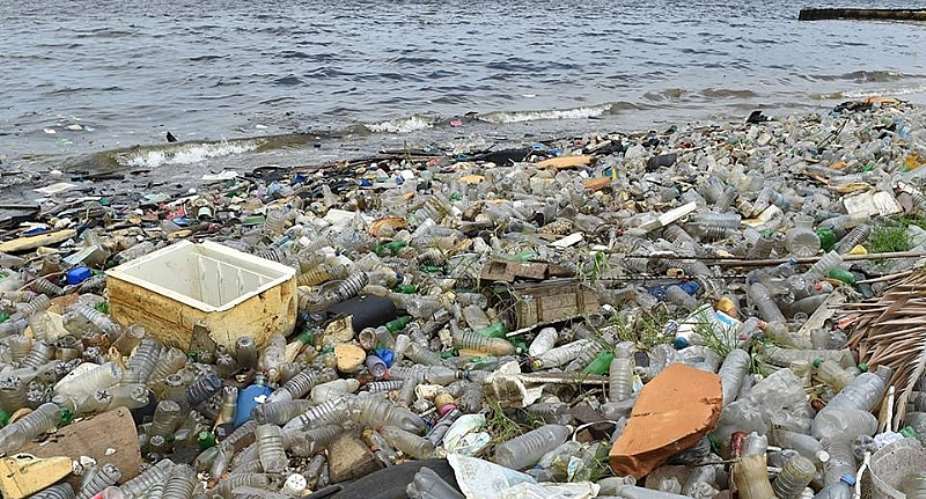Honorable, we are happy for the commencement of the construction of the Accra Sanitary Sewer and Storm water Drainage Project and dredging of the major drains. But we believe that this project will only curtail the flooding situation but will not be the panacea to the perpetual filth and waste in our cities.
Hon, it is about time for us to understand that plastic (single use plastic) is Ghana’s sanitation problem. Obviously, plastic constitutes more than 85 percent of waste generated in our homes, markets and other public places with biodegradable and chemical waste making up the other 15 percent.
The sanitation issue is a matter of concern to Bureau of Marine/ Maritime Protection - Ghana because all the drains we are constructing and desilting flow into the ocean which is the source and conduit of most of Ghana’s economic activities. For example, over 2.6 million Ghanaians representing 10 per cent of the population are dependent on the fisheries sector for livelihoods, and over 3.5 billion people worldwide depend on the ocean as their primary source of food.
Hon, the situation is a pervasive threat to public health with serious negative economic impact. A huge chunk of this plastic waste ends up in the ocean. Research published in Science Advance in 2015 confirms that about 9 per cent of all plastic waste ever generated had been recycled, while 12 per cent was incinerated and 80 per cent is sitting in the natural environment and get wash through our rivers and drains into the ocean.
Honestly, plastic waste has caused serious economic loss to Ghana since we spend $290 million each year on sanitation. In 2018 world Economic Forum, a researcher, indicated that marine plastic pollution cost the world up to $ 2.5 billion united state dollars a year. They again indicated that damage caused by plastics presence in the ocean cost about $13 billion annually in losses for tourism and recreation, shipping and fishing.
United Nation advised that there is already 5 trillion pieces of plastic in the ocean, whiles 8 million tons enters the ocean every year, so if we keep producing and failing to properly dispose it, plastic will outweigh fish in the ocean by 2050. Its presence in the ocean seriously affects Fisheries, Tourism and Recreation, Energy, Public health and marine ecosystem.
Hon, if we refuse to confront plastic as the main cause of sanitation problems in Ghana, we will continue to dwell in a vicious cycle of waste of public funds on sanitation every year.
Finally, for us to bequeath a strong, vibrant, attractive and healthy nation and planet for the future and unborn generations, we must enforce our environmental laws and regulations.
Authorities must:
· Enforce the right policies
· Advocate for action
· Proper recycling
· Encourage reusable containers
· Stiffer government regulation on manufacturing industries
· Levy on single used plastic
· Support plastic ban
· Volunteer in regular clean up exercises
· Support legislators who back legislation to protect oceans and limit environmental pollution.
· Innovative waste management
· Control rubbish, disposal of used automobile oil and chemicals in our homes, shops and markets.
Solving our sanitation problem will improve public health, reduce poverty, create jobs, increase fish stock, improve tourism and recreation and help Ghana achieve united Nation 17 Sustainable Development Goals (SDGs).
BUREAU OF MARINE/ MARITIME PROTECTION - GHANA.
CONTACT: 0241425666





 Dumsor: Mathew Opoku Prempeh has been disrespectful, he should be fired – IES
Dumsor: Mathew Opoku Prempeh has been disrespectful, he should be fired – IES
 NPP prioritizing politics over power crisis solution — PR Strategist
NPP prioritizing politics over power crisis solution — PR Strategist
 E/R: Gory accidents kills 3 persons at Aseseaso, several others critically injur...
E/R: Gory accidents kills 3 persons at Aseseaso, several others critically injur...
 Nobody can come up with 'dumsor' timetable except Energy Minister – Osafo-Maafo
Nobody can come up with 'dumsor' timetable except Energy Minister – Osafo-Maafo
 Dumsor: You ‘the men’ find it difficult to draw timetable when ‘incompetent’ NDC...
Dumsor: You ‘the men’ find it difficult to draw timetable when ‘incompetent’ NDC...
 We’re working to restore supply after heavy rains caused outages in parts of Gre...
We’re working to restore supply after heavy rains caused outages in parts of Gre...
 NPP government plans to expand rail network to every region — Peter Amewu
NPP government plans to expand rail network to every region — Peter Amewu
 Dumsor must stop vigil part 2: We’ll choose how we demonstrate and who to partne...
Dumsor must stop vigil part 2: We’ll choose how we demonstrate and who to partne...
 2024 elections: NDC stands on the side of morality, truth; NPP isn't an option —...
2024 elections: NDC stands on the side of morality, truth; NPP isn't an option —...
 Akufo-Addo has moved Ghana from 'Beyond Aid' to ‘Beyond Borrowing’ — Haruna Idri...
Akufo-Addo has moved Ghana from 'Beyond Aid' to ‘Beyond Borrowing’ — Haruna Idri...
